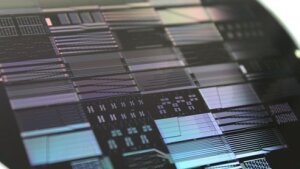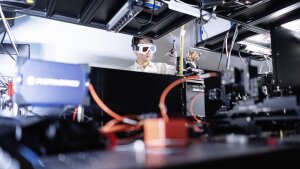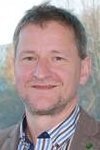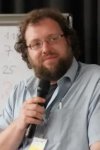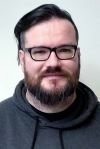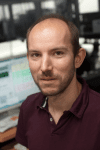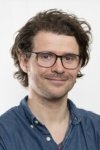Welcome to InQuoSens!
Logo Co-funded by the European Union.
Image: European Union.The Thuringian Innovation Center InQuoSens brings together excellent and internationally visible research activities of ACP at the Friedrich Schiller University Jena and of the Institute for Micro- and Nanotechnologies at the Technical University of Ilmenau (IMN)External link in the key technology quantum optics and sensor technology. By means of strategic investments measures and a joint strategy process at both locations, these fields are synergistically developed. In its second funding period from 2024 onwards, InQuoSens focuses on Quantum Photonic Integrated Circuits (Q-PICs). On this basis, InQuoSens will prioritize the economic relevance and networking with industrial partners in the Free State of Thuringia higher than before. To this end, a tailor-made, cross-site research infrastructure and corresponding personnel expertise for the research topics is set up at both locations, Jena and Ilmenau. At the same time, the corresponding competence portfolio will be continuously updated together with actors from science and industry. Through these activities, InquoSens will take on the role as an internationally visible center of scientific excellence which contributes significantly to increase the innovative power of the Thuringian economy.
The Thuringian Innovation Center InQuoSens at the University of Jena is supported in its second funding phase by the Thuringian State (2024 IZN 0001 & 2025 IZN 0002) and the European Regional Development Fund (EFRE) with EUR 4.5 million in 2024-2028. Our InQuoSens partner, the Technical University of Ilmenau, is supported with an equivalent amount of funding.
Previously in its first funding phase 2017-2022, InQuoSens was supported by the Thuringian State (2017 IZN 0012) and the European Regional Development Fund (EFRE) with EUR 3.0 million and with further funds for the installment of the embeded research groups.
About Quantum Integrated Circuits (Q-PICs)
Photonic Integrated Circuits (PICs) on a wafer written be electron beam lithography.
Image: Fraunhofer IOFPhotonic Integrated Circuits (PICs) will be able to realize the same or even improved functionalities as discrete optical elements on optical chips, just as discrete electrical circuits were integrated on chips in the 20th century. In addition, it is already clear that PICs will be extremely important components in future 5G/6G communication systems due to their energy efficiency and climate friendliness. Programmable PICs, which often consist of cascaded Mach-Zehnder interferometers, are becoming increasingly important for emerging applications such as photonic quantum information processing, quantum-enhanced sensors, optical neural networks and machine learning due to their compact dimensions, high computing speed, low power consumption, good scalability and high phase stability. These new applications place high demands on photonic integration on a very large scale and on the performance parameters of the diverse on-chip components to be integrated, such as optical modulators with extremely low losses, ultra-high switching speeds up to the GHz range and high power efficiency.
Doctoral student Katsuya Tanaka in the ACP/InquoSens Quantum Lab.
Image: Jens Meyer (University of Jena)Building on this state of the art, InQuoSens has identified PICs for quantum technologies, i.e. Quantum Photonic Integrated Circuits (Q-PICs), as an extremely attractive next innovation leap. Compared to “normal” PICs, Q-PICs have some fundamental requirements, the technological implementation of which involves some major challenges. For example, the realization of quantum information processes requires complete integration in the quantum system while preserving the quantum information in a qubit system or the coupling of different qubit systems with minimal losses.
Therefore, all components and functionalities for quantum information processing must be integrated. Based on the correspondingly expanded technology platforms, Q-PICs open the door to the new application areas of 2nd generation quantum technologies. They will be able to address enormously wide wavelength ranges and at the same time, just like classic electronic chips, have immense scaling potential for later production in large quantities for volume applications. However, since Q-PICs require nonlinear and active elements, they cannot be manufactured from established materials such as pure silicon. Rather, Q-PICs require the integration of several functional layers and materials on the wafer scale. The Innovation Center InQuoSens is taking on exactly this challenge.
Contact
Prof. Dr. Andreas Tünnermann
Image: Anne Günther (University of Jena)Prof. Andreas TÜNNERMANN
Director
Institute of Applied Physics, Jena
Email: andreas.tuennermann@uni-jena.de
Phone: +49 3641-9-47800
Director Fraunhofer IOF JenaExternal link
Jens Müller
Image: PrivateProf. Jens MÜLLER
Co-Director
Team leader E-PhoQuant Research Group
Institute for Micro- and Nanotechnologies
Email: jens.mueller@tu-ilmenau.de
Phone: +49 3677-69-2606
Vice-president for International Relations and Transfer, TU IlmenauExternal link
Thomas PERTSCH
Image: PrivateProf. Thomas PERTSCH
Co-Director
Institute of Applied Physics, Jena
Email: thomas.pertsch@uni-jena.de
Phone: +49 3641-9-47560
Group leader Nano & Quantum Optics
Falk EILENBERGER
Image: PrivateDr. Falk EILENBERGER
InQuoSens Group Leader
Nanophotonic Materials
Email: falk.eilenberger@uni-jena.de
Phone: +49 3641-807-274
Dr. Reinhard Geiss
Image: Max Planck School of PhotonicsDr. Reinhard GEISS
InQuoSens Group Leader
Email: reinhard.geiss@uni-jena.de
Phone: +49 3641-807-0
Dr. Christian Helgert
Image: Anne Günther (University of Jena)Dr. Christian HELGERT
CEO Abbe Center of Photonics
InQuoSens Innovation Officer, Jena
Email: christian.helgert@uni-jena.de
Phone: +49 3641-9-47960
Dr. Maria Illing / TU Ilmenau.
Image: TU IlmenauMaria ILLING
InQuoSens Innovation Officer, Ilmenau
Email: maria.illing@tu-ilmenau.de
Phone: +49 3677-69-3402
Johannes Kretzschmar
Image: PrivateJohannes KRETZSCHMAR
InQuoSens Digitaliziation Officer, Jena
Email: johannes.kretzschmar@uni-jena.de
Phone: +49 3641-9-47577
Dr. Frank Setzpfandt
Image: PrivateDr. Frank SETZPFANDT
InQuoSens Chief Executive Officer
Quantum Optics
Email: f.setzpfandt@uni-jena.de
Phone: +49 3641-9-47569
Dr. Thomas Siefke.
Image: Private archiveDr. Thomas SIEFKE
InQuoSens Group Leader
Microstructure Technology
Email: thomas.siefke@uni-jena.de
Phone: +49 3641-9-47837
Prof. Fabian Steinlechner.
Image: Fraunhofer IOFProf. Fabian STEINLECHNER
InQuoSens Group Leader
Experimental Quantum Information
Email: fabian.steinlechner@uni-jena.de
Phone: +49 3641-807-733

